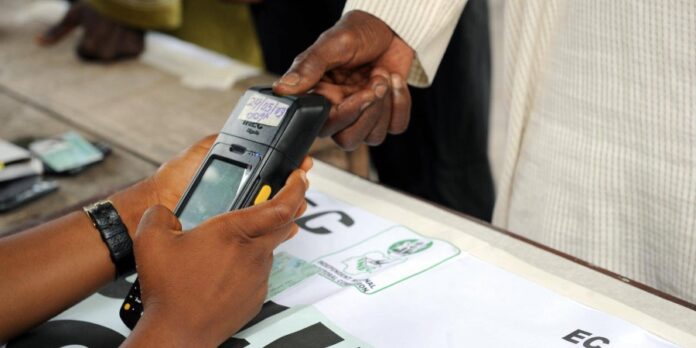Illustrative Image: Building Public Trust in Biometric Voting: Privacy, Cybersecurity, and Digital Literacy Challenges in Tanzania’s Electoral System
Image Source & Credit: Chatham House
Ownership and Usage Policy
A recent study by Msuya, D. S. (2025) titled “Privacy, Cybersecurity Risks and Public Trust in the Acceptance and Usage of Biometric Authentication: A Case of Tanzania’s Voting System” published in Digitala Vetenskapliga Arkivet reveals that voter apprehension around biometric systems stems largely from fears of surveillance, misuse of personal data, and inadequate legal protections.
“
Public trust, shaped by transparency, legal protection, and digital literacy, is the key factor determining acceptance of biometric voting systems.
-Msuya, D. S. 2025
The study explores the complex interplay between privacy concerns, cybersecurity risks, and public trust in the adoption of biometric authentication within Tanzania’s voting systems. As the country continues to modernize its electoral processes, the study investigates how these factors influence voter acceptance, with a particular focus on the moderating role of digital literacy. The research reveals that voter apprehension around biometric systems stems largely from fears of surveillance, misuse of personal data, and inadequate legal protections. Cybersecurity vulnerabilities—such as weak infrastructure and lack of transparency—further erode trust in the system. Compounding these issues is the low level of digital literacy, especially in rural areas, which leads to confusion, misinformation, and resistance to technological adoption. Ultimately, public trust emerges as a fragile yet essential component, shaped by institutional transparency, legal clarity, and effective civic education.
How the Study was Conducted
The study employed a two-phase qualitative research design. This approach allowed for both theoretical grounding and real-world insight, ensuring a comprehensive understanding of the issue.
Phase One: Systematic Literature Review
The first phase focused on synthesizing existing knowledge and identifying gaps in the literature. Following PRISMA guidelines (Preferred Reporting Items for Systematic Reviews and Meta-Analyses), the researcher reviewed studies retrieved from Scopus, IEEE Xplore, and Google Scholar. A total of nine studies met the inclusion criteria, which centered on biometric voting, privacy, cybersecurity, and trust.
Phase Two: Semi-Structured Interviews
To complement the literature review, the second phase involved semi-structured interviews with key stakeholders. Using purposive sampling, 15 participants were selected: 5 electoral commission officials, 5 cybersecurity professionals, 5 eligible voters from both urban and rural regions.
These interviews explored participants’ perceptions of privacy, cybersecurity, and trust in biometric voting systems. The data was analyzed using thematic analysis, which helped uncover patterns and insights across diverse perspectives.
To ensure trustworthiness, the study adhered to qualitative research standards of credibility, transferability, dependability, and confirmability. Triangulation between literature and interview findings further strengthened the reliability of the conclusions.
What the Authors Found
The authors found that public trust is the critical determinant in the successful adoption of biometric authentication in Tanzania’s voting system. While privacy concerns, cybersecurity risks, and low digital literacy all pose significant challenges, the research shows that: Without trust built through transparent governance, strong legal protections, and inclusive civic education technical innovations like biometric voting cannot be effectively embraced. In other words, the technology itself is not the barrier; it’s the social and institutional context surrounding it that determines whether voters will accept and use it.
Why is this important
Safeguarding Electoral Integrity
Biometric authentication promises to reduce fraud and improve voter identification. But without public trust, even the most advanced systems can backfire. The study highlights how privacy fears and cybersecurity vulnerabilities can erode confidence in elections—threatening the very legitimacy of democratic processes.
Protecting Citizens’ Rights
Biometric data is deeply personal. If mishandled, it can lead to surveillance, identity theft, or discrimination. This research underscores the urgency of strong data protection laws and ethical governance to ensure that technology empowers citizens rather than exploits them.
Bridging the Digital Divide
The study reveals how digital literacy gaps, especially in rural areas, create barriers to participation. Addressing this helps ensure that no voter is left behind in the digital transformation of democracy.
Global Relevance
While focused on Tanzania, the study resonates globally. Many countries are grappling with how to balance technological innovation with civil liberties. This research contributes to a broader understanding of how to responsibly implement digital identity systems in governance.
What the Authors Recommended
- The study emphasises revising and enforcing Tanzania’s legal framework to safeguard biometric data, ensuring transparency and alignment with global privacy standards to boost public confidence.
- The study advocates investing in robust technical defences—such as encryption, access controls, and incident response systems—and training electoral staff to protect voting systems from cyber threats.
- Launch inclusive education campaigns to help voters understand biometric technologies, dispel misconceptions, and promote informed participation—especially in underserved rural areas.
- Ensure electoral bodies clearly communicate how biometric data is handled, publish system audits, and involve civil society and media in oversight to foster trust.
- In addition, the authors emphasise building partnerships among government, tech experts, and community leaders to shape policy, gather feedback, and continuously improve biometric voting systems based on public input.
In conclusion, Msuya’s (2025) study underscores that the success of biometric voting in Tanzania hinges not merely on technological sophistication but on cultivating public trust through transparency, accountability, and education. By addressing privacy concerns, strengthening cybersecurity frameworks, and empowering citizens with digital literacy, Tanzania can ensure that technological innovation enhances—rather than undermines—democratic participation. Ultimately, a secure, inclusive, and trusted biometric system represents not only progress in electoral modernization but also a vital step toward safeguarding the integrity and legitimacy of the nation’s democracy.
















 The African Research (AR) Index is a comprehensive scholarly directory and database focused explicitly on journal publishers that publish and disseminate African research.
The African Research (AR) Index is a comprehensive scholarly directory and database focused explicitly on journal publishers that publish and disseminate African research.

